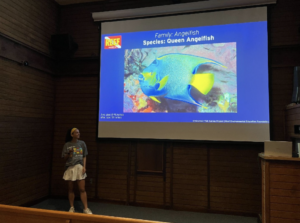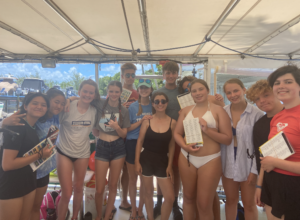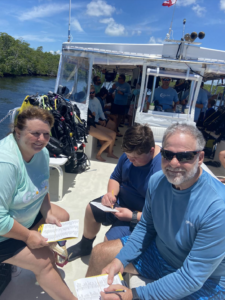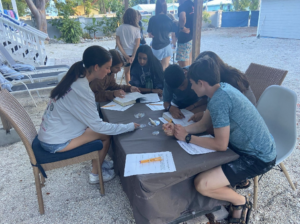“You’re the people who count fish.” Or, “You guys work with corals, right?” These are two of the most common responses we get at REEF when we ask people if they’ve heard of us before. And while the first is mostly right, the second, not so much. It’s understandable though, the confusion on what exactly is done at REEF — I myself wasn’t exactly sure when starting my internship this summer (although I would quickly learn).
REEF stands for Reef Environmental Education Foundation, and is a marine conservation non-profit based in the Florida Keys, but with a membership of over 75,000 worldwide. REEF’s mission is to protect biodiversity and ocean life worldwide by actively engaging and inspiring the public through citizen science, education, and partnerships with the scientific community. This is mostly done through four main projects. The Volunteer Fish Survey Project (VFSP), the Invasive Species Program, the Grouper Moon Project, and the Ocean Explorers Education Programs.
I’ve had the opportunity to get involved in each of these programs this summer, but the one I’m most closely tied to is Ocean Explorers. This is our education program where we lead groups through immersive and hands-on activities centered around marine ecosystems. We work with all ages and experience levels, and tailor the program for each group’s needs.
As a Marine Conservation Intern, it’s my job to lead these events. My orientation at REEF was spent learning them inside and out in our on campus Interpretive Center (IC) with my fellow interns. There were four presentations total we had to learn: three about our other programs, and one about Florida Keys ecology. Hearing them for the first time, I was overwhelmed. I didn’t think I could ever learn them as flawlessly as our Education and Program Manager who was teaching them to us.
But when it came time to lead my first presentation of the summer, I felt confident and ready after all the practice I’d had. I was doing Fish ID, a presentation that goes through the most common fish you can see in the Florida Keys. It was for a group called Road Scholars, a tour group consisting of grandparents and their grandchildren. I found it fun to share my little tips and tricks for each fish, and see which ones they like the most (there’s many for the French Angelfish, including the yellow on its scales that looks like it has a french manicure, which are always hits).

Teaching Fish ID Presentation at John Pennekamp Coral REEF State Park (The trick to remember the Queen Angelfish is they have a crown on top of their head)
It was encouraging as the group became more engaged. These people were on vacation, and had never seen any of these fish, yet were excited and eager to learn. Afterwards, we did a mock survey with them of the fish we have on our walls, and it was awesome to see how much they remembered. Kids as young as 5 were identifying grunts, and reminding their grandparents of the names of the fish!
I’ve also done a few events with a program known as Road Less Traveled, made up of young teenagers. Fish ID with them was super fun, and they were all eager to guess the different families and full of questions about their behaviors and how often I see different fish. The best part though was I got to go out and snorkel with them after, so I could see for myself how much they remembered.
As soon as we got in the water, the kids were excitedly yelling amongst themselves about all the fish they were seeing — so many Sergeant majors and Yellow-tail snapper right at the surface! I’ve done Fish ID diving with a group as well, but snorkeling was a lot more engaging because the kids could ask me questions in real time, popping their head up to point out a specific fish or describe one they weren’t sure about. The boat debrief after was filled with more questions and what everyone’s favorite fish was, like parrotfish or the trumpetfish.

My awesome Road Less Traveled surveyors

My surveyors from a Great Annual Fish Count dive
Fish ID is one of my favorite things to do with groups, mostly because I know from personal experience how much more fulfilling snorkeling and diving is when you know the different fish by name, instead of just passively taking in the different darting colors. Even when someone can only tell me the name of one fish that they saw, they always do it with pride and excitement, and I can tell they’ll remember that fish for a long time.
Fish ID is the most common presentation we give to groups, but we also do a lot of Lionfish, as well. With the same program but a different group, we had one day where we did a quick Lionfish talk, and then a dissection and our Fish Investigator activity. In the activity, I had 5 different fish that had been found in the stomachs of Lionfish, and the group had to figure out what species they were. It’s definitely tricky, because the fish are usually juveniles and mostly stripped of their colors, but the kids were great in scouring the Fish ID books and picking out different features to match. They also loved the dissection, completely fascinated by the different parts and their venomous spines.

Lionfish Fish Investigator Activity with Road Less Traveled
There’s been many more events like these throughout the summer, and they’re always the highlight of my week. Many of these people are just here on vacation, and are coming in with little to no knowledge about the ocean. I feel honored to have this role of bridging the gap between them and the marine world. We all rely on the ocean everyday, in so many ways we don’t realize, and these education programs are an amazing way to make it more accessible to people. The more people know about the ocean, the more people are inclined to help protect it.
And as much as I have taught others this summer, I have learned so much as well, from the REEF Staff and even from those I’m supposed to be teaching. I’m excited to share more of what I learned and my experiences with our other programs in my next blog posts!

